考研热作文
专四英语作文考研热
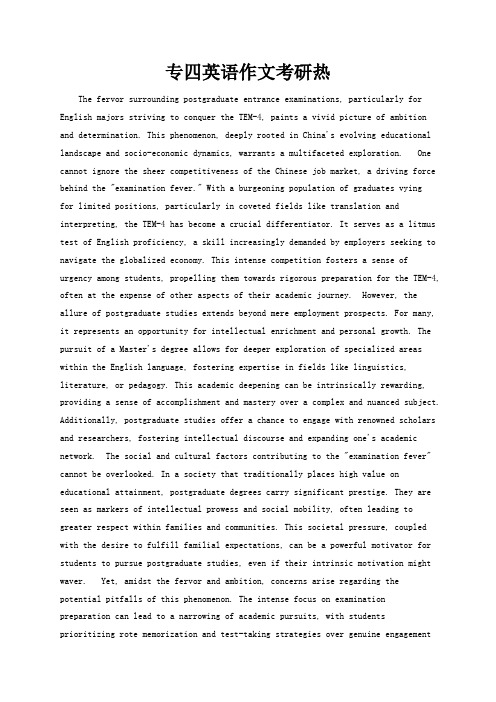
专四英语作文考研热The fervor surrounding postgraduate entrance examinations, particularly for English majors striving to conquer the TEM-4, paints a vivid picture of ambition and determination. This phenomenon, deeply rooted in China's evolving educational landscape and socio-economic dynamics, warrants a multifaceted exploration. One cannot ignore the sheer competitiveness of the Chinese job market, a driving force behind the "examination fever." With a burgeoning population of graduates vyingfor limited positions, particularly in coveted fields like translation and interpreting, the TEM-4 has become a crucial differentiator. It serves as a litmus test of English proficiency, a skill increasingly demanded by employers seeking to navigate the globalized economy. This intense competition fosters a sense of urgency among students, propelling them towards rigorous preparation for the TEM-4, often at the expense of other aspects of their academic journey. However, the allure of postgraduate studies extends beyond mere employment prospects. For many, it represents an opportunity for intellectual enrichment and personal growth. The pursuit of a Master's degree allows for deeper exploration of specialized areas within the English language, fostering expertise in fields like linguistics, literature, or pedagogy. This academic deepening can be intrinsically rewarding, providing a sense of accomplishment and mastery over a complex and nuanced subject. Additionally, postgraduate studies offer a chance to engage with renowned scholars and researchers, fostering intellectual discourse and expanding one's academic network. The social and cultural factors contributing to the "examination fever" cannot be overlooked. In a society that traditionally places high value on educational attainment, postgraduate degrees carry significant prestige. They are seen as markers of intellectual prowess and social mobility, often leading to greater respect within families and communities. This societal pressure, coupled with the desire to fulfill familial expectations, can be a powerful motivator for students to pursue postgraduate studies, even if their intrinsic motivation might waver. Yet, amidst the fervor and ambition, concerns arise regarding thepotential pitfalls of this phenomenon. The intense focus on examinationpreparation can lead to a narrowing of academic pursuits, with studentsprioritizing rote memorization and test-taking strategies over genuine engagementwith the English language and its cultural richness. This can stifle creativity and critical thinking, essential skills for navigating the complexities of the modern world. Moreover, the pressure-cooker environment of postgraduate entrance examinations can take a toll on students' mental health and well-being, leading to anxiety, burnout, and a sense of disillusionment. Therefore, it is crucial to strike a balance. While acknowledging the importance of the TEM-4 and postgraduate studies as pathways to career advancement and personal growth, we must advocatefor a holistic approach to education. This entails fostering a genuine love for the English language, encouraging intellectual curiosity beyond the confines of examinations, and prioritizing the mental and emotional well-being of students. By nurturing a passion for learning and fostering a supportive academic environment, we can ensure that the pursuit of postgraduate studies becomes a fulfilling journey of self-discovery and intellectual exploration, rather than a mere means to an end.。
我对考研热的看法英语作文
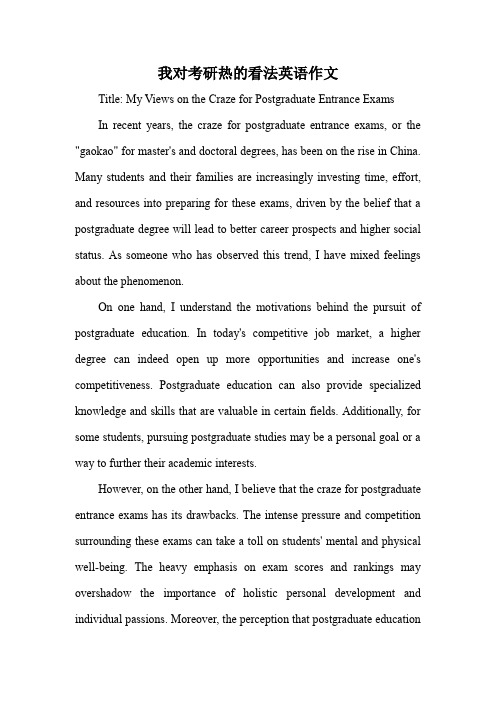
我对考研热的看法英语作文Title: My Views on the Craze for Postgraduate Entrance ExamsIn recent years, the craze for postgraduate entrance exams, or the "gaokao" for master's and doctoral degrees, has been on the rise in China. Many students and their families are increasingly investing time, effort, and resources into preparing for these exams, driven by the belief that a postgraduate degree will lead to better career prospects and higher social status. As someone who has observed this trend, I have mixed feelings about the phenomenon.On one hand, I understand the motivations behind the pursuit of postgraduate education. In today's competitive job market, a higher degree can indeed open up more opportunities and increase one's competitiveness. Postgraduate education can also provide specialized knowledge and skills that are valuable in certain fields. Additionally, for some students, pursuing postgraduate studies may be a personal goal or a way to further their academic interests.However, on the other hand, I believe that the craze for postgraduate entrance exams has its drawbacks. The intense pressure and competition surrounding these exams can take a toll on students' mental and physical well-being. The heavy emphasis on exam scores and rankings may overshadow the importance of holistic personal development and individual passions. Moreover, the perception that postgraduate educationis a guarantee of success may lead to unrealistic expectations and disappointment if the desired outcomes are not achieved.In my opinion, while postgraduate education can be a valuable pursuit, it should not be seen as the only path to success or fulfillment. It is essential for individuals to carefully consider their own goals, interests, and capabilities before deciding whether to pursue postgraduate studies. It is also important to maintain a healthy balance between academic pursuits and other aspects of life, such as relationships, hobbies, and personal well-being.In conclusion, while I recognize the benefits of postgraduate education, I believe that the craze for postgraduate entrance exams should be approached with a balanced perspective. It is crucial for individuals to make informed decisions based on their own values and aspirations, rather than simply following societal expectations or trends. Ultimately, success and fulfillment come from pursuing goals that are meaningful and aligned with one's personal values and passions.。
考研热或者疯狂考研写一篇英语作文

The Phenomenon of Crazy Postgraduate Entrance Examination FeverIn recent years, the craze for postgraduate entrance examination has reached unprecedented heights in China. This phenomenon, often referred to as "crazy postgraduate entrance examination fever," has become a topic of intense discussion among the education community and society at large. As the competition for university placements becomes increasingly fierce, students are willing to go to any lengths to secure a spot in a prestigious graduate program. The root causes of this fever can be traced to multiple factors. Firstly, the ever-growing demand for higher education in China has led to a significant increase in the number of students applying for postgraduate programs. This has created a highly competitive environment where students are required to score exceptionally high marks just to secure a place. Secondly, the perception that a postgraduate degree will lead to better job opportunities and higher salaries has further fueled the mania. Intoday's competitive job market, having a postgraduatequalification often gives individuals an edge over their peers.However, this craze for postgraduate entrance examination has also given rise to several concerns. One of the primary worries is the immense pressure that students face during this period. The relentless pursuit of high scores often leads to excessive stress and anxiety, affecting their mental health and overall well-being. Additionally, the intense competition can lead to unethical practices such as cheating and plagiarism, which not only undermine the integrity of the examination system but also harm the reputation of the participating institutions.Moreover, the focus on postgraduate entrance examination scores often overshadows other important aspects of education. The emphasis on scoring high marks can lead to a narrow and one-sided approach to learning, where students neglect other valuable skills such ascritical thinking, problem-solving, and communication. This can have long-term negative impacts on their personal and professional development.To address these concerns, a balanced approach towards postgraduate education is necessary. Firstly, institutions should strive to create a more inclusive and diverse learning environment that caters to the needs and interests of a wide range of students. This can be achieved by offering a variety of courses and programs that cater to different fields and disciplines. Secondly, emphasis should be placed on fostering a healthy learning culture that promotes critical thinking, innovation, and collaboration. This will help students develop a broad range of skillsthat are essential for their future success.In conclusion, the craze for postgraduate entrance examination fever is a complex phenomenon that requires a nuanced understanding and approach. While the pursuit of higher education is indeed admirable, it is crucial to strike a balance between academic achievements and personal well-being. By fostering a healthy learning culture and promoting a more inclusive and diverse educational environment, we can ensure that the next generation of leaders and innovators is well-prepared to face the challenges of the future.**疯狂考研热现象**近年来,考研热潮在中国达到了前所未有的高度。
考研热潮英语作文
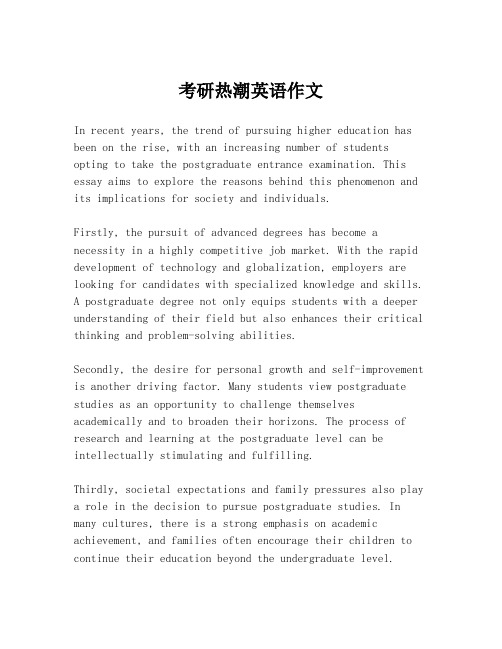
考研热潮英语作文In recent years, the trend of pursuing higher education has been on the rise, with an increasing number of students opting to take the postgraduate entrance examination. This essay aims to explore the reasons behind this phenomenon and its implications for society and individuals.Firstly, the pursuit of advanced degrees has become a necessity in a highly competitive job market. With the rapid development of technology and globalization, employers are looking for candidates with specialized knowledge and skills.A postgraduate degree not only equips students with a deeper understanding of their field but also enhances their critical thinking and problem-solving abilities.Secondly, the desire for personal growth and self-improvement is another driving factor. Many students view postgraduate studies as an opportunity to challenge themselves academically and to broaden their horizons. The process of research and learning at the postgraduate level can be intellectually stimulating and fulfilling.Thirdly, societal expectations and family pressures also play a role in the decision to pursue postgraduate studies. In many cultures, there is a strong emphasis on academic achievement, and families often encourage their children to continue their education beyond the undergraduate level.However, the postgraduate entrance examination craze also brings about certain challenges. The intense competition for limited spots can lead to stress and anxiety among students. Additionally, the focus on exams may overshadow the importance of genuine interest and passion for the subject of study.In conclusion, the craze for postgraduate entrance examinations reflects the changing dynamics of the job market and societal values. While it is important to recognize the benefits of advanced education, it is equally crucial to ensure that the pursuit of postgraduate studies is driven by genuine interest and not solely by external pressures.。
考研热原因英语作文

考研热原因英语作文The reason why many people are enthusiastic about taking the postgraduate entrance examination is that they want to pursue further study and improve their academic qualifications. This is especially true for those who hope to enhance their competitiveness in the job market or to gain more professional knowledge in their field.Another reason is that preparing for the postgraduate entrance examination provides an opportunity for individuals to review and consolidate their undergraduate knowledge. Many people believe that the process of preparing for the examination can help them to better understand the subjects and improve their academic abilities.Moreover, for some individuals, the postgraduate entrance examination is a way to challenge themselves and prove their capabilities. They see it as a personal achievement and a test of their determination andperseverance. They believe that successfully passing the examination will bring them a sense of accomplishment and pride.In addition, the increasing demand for high-level talents in various industries has also driven thepopularity of the postgraduate entrance examination. Many employers prefer candidates with postgraduate degrees, and this has motivated more people to pursue further study through the examination.Furthermore, the influence of social and family expectations cannot be ignored. In some cultures, obtaining a postgraduate degree is considered a symbol of success and a way to gain respect and recognition from others. This social pressure can also contribute to the enthusiasm for the postgraduate entrance examination.In conclusion, the reasons for the enthusiasm for the postgraduate entrance examination are diverse and complex. It is a combination of personal aspirations, academicambitions, career prospects, social expectations, and the demand for high-level talents in the job market.。
考研热英语作文
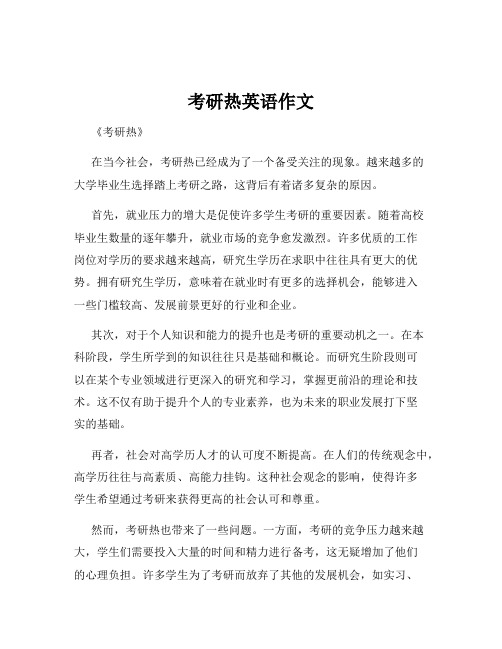
考研热英语作文《考研热》在当今社会,考研热已经成为了一个备受关注的现象。
越来越多的大学毕业生选择踏上考研之路,这背后有着诸多复杂的原因。
首先,就业压力的增大是促使许多学生考研的重要因素。
随着高校毕业生数量的逐年攀升,就业市场的竞争愈发激烈。
许多优质的工作岗位对学历的要求越来越高,研究生学历在求职中往往具有更大的优势。
拥有研究生学历,意味着在就业时有更多的选择机会,能够进入一些门槛较高、发展前景更好的行业和企业。
其次,对于个人知识和能力的提升也是考研的重要动机之一。
在本科阶段,学生所学到的知识往往只是基础和概论。
而研究生阶段则可以在某个专业领域进行更深入的研究和学习,掌握更前沿的理论和技术。
这不仅有助于提升个人的专业素养,也为未来的职业发展打下坚实的基础。
再者,社会对高学历人才的认可度不断提高。
在人们的传统观念中,高学历往往与高素质、高能力挂钩。
这种社会观念的影响,使得许多学生希望通过考研来获得更高的社会认可和尊重。
然而,考研热也带来了一些问题。
一方面,考研的竞争压力越来越大,学生们需要投入大量的时间和精力进行备考,这无疑增加了他们的心理负担。
许多学生为了考研而放弃了其他的发展机会,如实习、社交等,这在一定程度上限制了他们的综合发展。
另一方面,部分学生考研的目的不明确,只是盲目跟风,这不仅浪费了时间和精力,也可能导致在研究生阶段无法真正投入到学习和研究中。
为了应对考研热带来的问题,学生们需要更加理性地看待考研。
在决定考研之前,应该充分考虑自己的职业规划、兴趣爱好以及自身的能力和条件。
不要仅仅因为就业压力或者盲目跟风而选择考研。
同时,高校和社会也应该为学生提供更多的职业指导和发展机会,帮助他们树立正确的就业观和价值观。
对于高校来说,应该不断优化本科教育,提高本科教学质量,让学生在本科阶段就能获得足够的知识和能力,以更好地适应社会的需求。
此外,高校还应该加强对学生的职业规划教育,引导学生根据自身的情况做出合理的选择。
考研热产生的影响英语作文

考研热产生的影响英语作文In recent years, the craze for the postgraduate entrance examination, commonly known as "kaoyan," has been on the rise in China. This trend has generated significant impacts on various aspects of society, ranging from educational policies to individual career choices. The intense competition surrounding the examination reflects the high value placed on academic qualifications in Chinese culture and the pressure to succeed in a rapidly changing job market.Firstly, the kaoyan craze has led to significant changes in educational policies and practices. Universities and research institutions have responded to the demand by expanding postgraduate programs and increasing the number of available spots. However, this expansion has also led to concerns about the quality of education, as institutions struggle to maintain high standards while accommodating a larger student body. Furthermore, the focus on postgraduate education has overshadowed the importance of undergraduate studies, potentially leading to a dilution of the overall quality of higher education in the country.Secondly, the kaoyan craze has had profound effects on individual career choices. Many students view postgraduate studies as a prerequisite for secure employment in competitive industries such as finance, technology, and healthcare. As a result, they forego valuable work experience and networking opportunities in order to focus on preparing for the exam. This obsession with academic qualifications can sometimes lead to a mismatch between individuals' skills and interests and the demands of the job market, resulting in career dissatisfaction and a浪费of talent.Moreover, the intense competition and high stakes associated with the kaoyan have taken a toll on students' mental health. The pressure to perform well can lead to anxiety, depression, and even physical illness. The constant comparison with peers and the expectation to excel can be debilitating, particularly for those who do not fare well in the exam. This competitive environment can also foster a culture of elitism and elitism, where success is equated solely with academic achievements.In addition, the kaoyan craze has given rise to amulti-billion-dollar industry centered on exam preparation. Tutoring centers, online courses, and coaching institutes have proliferated, catering to the needs of students seeking to gain an edge in the competition. While these services may provide valuable resources and guidance, they also contribute to the commercialization of education and the creation of a two-tiered system where those who can afford expensive tutoring have an unfair advantage.Finally, the kaoyan craze reflects a deep-seated cultural value in China that equates success with academic achievements. This mindset can limit individuals' life choices and career aspirations, encouraging them to pursue academic paths that may not align with their interests or talents. The overemphasis on postgraduate studies can also lead to a brain drain as highly qualified individuals pursue opportunities abroad, often due to better pay and working conditions.In conclusion, the postgraduate entrance examination craze in China has had far-reaching impacts on society, education, and individual lives. While it反映s the highvalue placed on academic qualifications and the desire for success, it also暴露s the challenges and trade-offs involved in pursuing these goals. It is crucial for society to strike a balance between academic pursuits and other important aspects of personal and professional development, ensuring that education remains a tool for personal growth and societal progress.**考研热对中国社会的影响**近年来,考研热潮在中国持续升温。
专四英语作文考研热
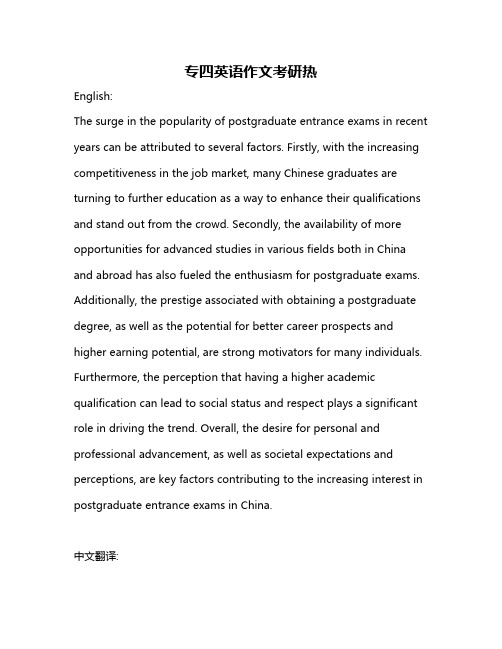
专四英语作文考研热English:The surge in the popularity of postgraduate entrance exams in recent years can be attributed to several factors. Firstly, with the increasing competitiveness in the job market, many Chinese graduates are turning to further education as a way to enhance their qualifications and stand out from the crowd. Secondly, the availability of more opportunities for advanced studies in various fields both in China and abroad has also fueled the enthusiasm for postgraduate exams. Additionally, the prestige associated with obtaining a postgraduate degree, as well as the potential for better career prospects and higher earning potential, are strong motivators for many individuals. Furthermore, the perception that having a higher academic qualification can lead to social status and respect plays a significant role in driving the trend. Overall, the desire for personal and professional advancement, as well as societal expectations and perceptions, are key factors contributing to the increasing interest in postgraduate entrance exams in China.中文翻译:近年来考研热的上涨可以归因于几个因素。
- 1、下载文档前请自行甄别文档内容的完整性,平台不提供额外的编辑、内容补充、找答案等附加服务。
- 2、"仅部分预览"的文档,不可在线预览部分如存在完整性等问题,可反馈申请退款(可完整预览的文档不适用该条件!)。
- 3、如文档侵犯您的权益,请联系客服反馈,我们会尽快为您处理(人工客服工作时间:9:00-18:30)。
The Post-graduate Craze
In recent years, more and more college students take part in the entrance exams for postgraduate schools. According to statistics, (from ), 111,421 students in Henan province took these exams this year, adding 12,045 more than last year. Why do more and more college students take these exams? The main reason are students’ desires for changing their current learning situation, expectations and effects from others, and social employment pressure.
Firstly, students take the exams to change their current learning situation. Because of their dissatisfaction with their universities’academic environment and the difficulties of transferring to another university, many students choose to take the exams to another better university. Take me for example; I am an English major at Henan Polytechnic University. English, as a liberal art at my university, is less valued than at a foreign studies university. For instance, reference books and related courses for TEM4 and TEM8 are fewer than those of other foreign studies universities. Thus, our passing rate of TEM4 last semester of my university is about 50% while Shanghai International Studies University is about 95%. So, if I want to change my learning situation and learn further about English, taking the exams to a foreign studies university is my best choice.
Secondly, students take the exams because of the expectations and effects from others. According to , more and more parents expect their children to get the three degrees which are Bachelor Degree, Master Degree, and Doctor Degree. In parents’ eyes, these three degrees are their children’s employment security and life safeguard in the future. In order to live up to their parents’expectations and lessen their parents’ anxiety, many of students take the exams. What’s more, some students take part in the exams because many of their friends take the exams. For example, Lilu, one of my friends, did not want to take the exams at first. But most of her intimates took the exams. So, naturally they were busy preparing for the exams and had no time to accompany her like before. Recalling the wonderful time when they played together, she felt deserted and lonely. Besides, she had no idea about the direction of her future development. Gradually affected by them, she decided to take the exams.
Thirdly, students take the exams to find a job to make a living. Nowadays employment pressure is greater and greater in our country, so some college students can not find a job after graduation. For one thing, the number of college graduates is increasing, but the social employment opportunities are limited. For another, some companies only employ job-hunters who have a Master Degree. Take peoples insurance company of china for example; it requires its clerks having a Master Degree or a higher degree (from ). Under such circumstances, we students have no choice but to take the exams to get a higher degree.
Considering the above reasons discussed, we college students should make decisions on the basis of our own conditions and needs when facing to the exams for postgraduate schools. Only in this way can we get rid of being the victim of Post-graduate Craze and make our own life in the future better.。
